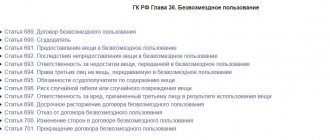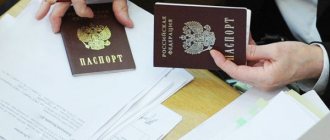The concept of free use of land
Free-term use of land is a type of right to own an allotment, provided for by the Land Code of the Russian Federation. The owner transfers the plot to the borrower with all documents and things related to it, and he, in turn, returns it on time in the same form and condition.
The agreement specifies what the user can and cannot do on the site. Unless otherwise agreed, the lender disposes of the land in accordance with its economic and technical purpose.
The features of the right of free use are as follows:
- mandatory: the conditions specified in the contract must be observed by the participants, otherwise civil liability measures will be applied to them;
- urgency: the contract is concluded for a specific time. Indefinite use is permissible for certain categories of loan holders;
- gratuitousness: the owner does not receive compensation for the transfer of land.
Free use differs from rent in that:
- the owner does not receive payment for providing land for someone else's use;
- the lender uses but does not own the land, that is, he does not have the right, for example, to take measures of possessory protection or demolish buildings on the site (unless this is permitted by the agreement).
Conditions for land transfer
The land plot is transferred for free use on the basis of a drawn up agreement. The provided allotment with a package of accompanying documentation is accepted by the loan holder and returned within the specified period in the same condition, with the exception of natural wear and tear. According to Art. 42 of the Land Code of the Russian Federation, the recipient of the allotment is obliged to:
- use the allocated area only for the purpose specified in the contract;
- preserve all established and identifying boundary marks;
- not to carry out actions that will lead to a deterioration of the environmental situation;
- comply with all fire and environmental safety standards, protect all types of natural resources;
- carry out work strictly in accordance with the approved contract;
- ensure improvement of soil fertility;
- Do not rent out the plot without the consent of the owner.
Under an agreement for free, fixed-term use of a land plot, the law does not exclude the participation of third parties, for example, servituaries.
Legal regulation of free use of land
Free-term use of land is regulated by the norms of the Civil and Land Codes of the Russian Federation, individual legislative acts adopted at the federal and local levels, in particular:
- Ch. 36 of the Civil Code of the Russian Federation contains the rules for gratuitous use: the concept, rights and obligations of the parties, liability for non-compliance with the contract, its termination and extension, features of state regulation of this form of ownership;
- Art. Chapter 24 4 of the Land Code of the Russian Federation provides for the possibility of transferring a site for free use;
- Art. Art. 39.9, 39.10 ch. 5.1 of the Land Code of the Russian Federation regulate the procedure for free, fixed-term and unlimited use of plots owned by the state and municipalities;
- Art. Chapter 42 6 of the Land Code of the Russian Federation contains the obligations of loan holders regarding the use of the allotment;
- Federal Law No. 171 of June 23, 2014 amends the Land Code of the Russian Federation, in particular, changes the concept of “gratuitous urgent use” to “gratuitous use”, etc.
The form of ownership of a plot in the form of lifelong inheritable use for private individuals is provided only for plots acquired before October 21, 2001. The right to receive land indefinitely is now available only to state and municipal authorities and institutions.
Types of free use of the site
Relations are regulated by the Land Code of the Russian Federation. Today, there are several types of free use of allotments:
- Public territories – the property manager is federal and municipal authorities;
- Private lands – property is owned by individuals and legal entities;
- Industrial farms are most often a service form of ownership.
The term of land use is determined depending on the economic owner. Thus, federal and municipal plots are transferred for a period established by law. Private forms of land ownership are based on civil law relations and require the conclusion of a legal (notarial) agreement between the owner of the territory and the recipient of income from the subsoil. Finally, the right to free use of land on industrial property arises in connection with the labor relations of superiors and subordinates.
It should be noted that federal and municipal property can only be transferred for the needs of government bodies and various entities. Citizens will not be able to receive such land for free exploitation. But they have the right to turn to private plots, having received written consent from the manager of the land plot.
Subjects of free use of land
The subjects of the right to free use of plots can be the state and municipalities, legal entities and individuals. Based on Art. 690 of the Civil Code of the Russian Federation, only the owner of the land, his representative or an authorized person can be a lender.
The lender can be the state and local governments that transfer land for free, fixed-term use:
- state and municipal authorities, enterprises, government institutions - for a period of up to a year;
- employees of transport enterprises, forestry and hunting enterprises, budgetary organizations in the form of official plots - for the duration of the employment contract (based on clause 2 of Article 24 of the Labor Code of the Russian Federation);
- religious organizations - for a period of up to 10 years;
- persons working under a government contract for the construction and reconstruction of buildings at the expense of the federal budget, etc.
A complete list of loan holders of state plots is given in Art. 39.10 Land Code of the Russian Federation.
The state can give a plot of land for indefinite (lifetime) use only to government bodies and related organizations (based on Article 39.9 of the Land Code of the Russian Federation).
The lender may be a legal entity that transfers the right to urgent use of the allotment to an employee in the form of an official allotment under an employment contract. In this case, the head, founder or representative of the controlling bodies of this legal entity cannot act as a land holder (based on Article 690 of the Civil Code of the Russian Federation).
The lender can be citizens who have entered into an agreement for the free use of a land plot with another individual or legal entity.
Borrowers can only be citizens of the Russian Federation and organizations registered and operating in Russia.
Free use agreement
The basic rules for drawing up agreements for the free use of land are contained in Art. 689-701 Civil Code of the Russian Federation. The essence of contracts of this type is that the owner of the land transfers it free of charge to the user (individual or legal entity) for a specific period, after which the user returns the plot in the same condition as it was on the date of signing the contract.
The user's obligations under the contract are as follows:
- Use the land only as permitted by its category, type of permitted use.
- Protect special signs (landmarks and geodesic) from damage.
- Take care of environmental protection.
- Comply with fire safety requirements.
- If the parties have specified deadlines for land development, ensure compliance with them.
- Comply with urban planning and sanitary-hygienic standards.
- Prevent deterioration of fertility and soil pollution.
- Comply with laws relating to land use.
The most important characteristics of the contract are its urgency and gratuitousness. In addition, essential information that must be included in the contract includes:
- Cadastral number of the plot.
- Land use category.
- Type of permitted use (code according to the VRI Classifier).
- Land area.
- The exact postal address of the site.
If any of the listed points is not in the contract, it is very easy to challenge it in court due to the lack of sufficient agreement.
Download the agreement for free use of land (sample)
Conditions for transferring the site for free use
The transfer of a land plot for free use is carried out on the basis of an agreement and legislative norms. The lender is obliged to provide the allotment with all documents and items related to it, the lender is obliged to return it on time in the same form and condition, taking into account expected normal wear and tear.
According to Art. Chapter 42 6 of the Land Code of the Russian Federation, the land holder is obliged to:
- use the site only for its intended purpose;
- preserve all geodetic and boundary signs of the allotment;
- do not carry out actions that worsen the environment;
- follow fire, environmental and sanitary safety standards, protect land, water and forest resources;
- carry out land development in accordance with the agreement;
- prevent deterioration of soil fertility;
- do not rent out land unless permitted by the owner.
The transfer of a plot of land for free use does not exclude the rights of third parties, for example, servituaries.
Free-term use of a land plot - Land Law (Sukhova E.A.)
Under an agreement for free, fixed-term use of a land plot, one party undertakes to transfer or is transferring the land plot (part of it) for free use for a certain period of time to the other party, and the latter undertakes to use the land plot (part of it) in accordance with its intended purpose and permitted use, and to comply with environmental, nature resources, urban planning and other legislation and return the land plot (part of it) in a condition suitable for its further intended use.
The right to transfer a land plot for free, fixed-term use belongs to the executive bodies of state power and local government bodies authorized to dispose of land plots.
Recipients of the right in question can only be the following categories of subjects:
- state and municipal institutions;
- federal government enterprises;
- bodies of state power and local self-government;
- citizens and legal entities. However, in accordance with the Land Code of the Russian Federation, land plots are not provided to citizens with the right of permanent (indefinite) use.
The basis for the emergence of the right to gratuitous fixed-term use of a land plot is the provision of land plots from lands in state or municipal ownership. In this case, the right to gratuitous fixed-term use can only arise from state and municipal institutions, federal government enterprises, state authorities and local governments by providing them with land plots by decision of executive bodies of state power or local government bodies that have the right to provide the corresponding land plots in within the limits of their competence in accordance with Art. 9-11 of the Land Code of the Russian Federation.
The maximum period for which a land plot in state or municipal ownership can be provided for free use should not exceed one year.
When providing land plots on this right from lands owned by citizens or legal entities, the period is determined by the contract: for example, when providing an official allotment - the term of the employment contract.
The RF Land Code provides for three cases of provision of land plots at this stage:
- from lands in state or municipal ownership, by executive bodies of state power or local government bodies specified in Art. 29, legal entities that, in accordance with the Code, have retained the right to receive land for use on the right of permanent, unlimited use, i.e. state and municipal institutions, state-owned enterprises, but for a period of no more than one year;
- from lands owned by citizens or legal entities, by other citizens and legal entities on the basis of an agreement;
- from the lands of organizations specified in paragraph 2 of Art. 24, to citizens in the form of a service allotment.
Agreement for free use of land
An agreement for the free use of a land plot is concluded in free written form. The sample is posted on the Rosreestr website and on the Internet. The agreement must include the following details:
1. Names of the parties:
- Full name and passport details of individual participants;
- full name of the company, address, full name of the authorized officer for organizations;
- Full name and details of the representative, if the parties act through them.
2. Information about the allotment: cadastral number, area, intended purpose, address and category.
3. Conditions for providing the site for free possession.
4. Inventory of buildings, objects and documents that are transferred to the loan holder;
5. Duration of the contract: the exact number of years or period, for example, the duration of a government contract. In the case of transfer of a state allotment for lifelong lease by a legal entity, the indefinite validity period of the agreement is indicated.
6. Responsibility of the parties in case of failure to fulfill the terms of the agreements.
7. Conditions for termination of the contract and the possibility of its extension.
An agreement concluded for a period of more than a year is subject to mandatory registration with Rosreestr.
On its official website you can find a sample of a standard agreement for the free provision of land for use.
Transfer of land for free use
An agreement with a term of less than a year does not need to be registered. In this case, the applicant submits a request for free use to the head of the owner organization, private owner or authorized government body. The owner and potential lender discuss all the conditions and features of the provision of the site orally.
The owner can convene a commission to consider the case. If the request is granted, an agreement is drawn up in free form or based on a sample from the Internet.
To formalize an agreement for a period of more than 1 year, you must collect the following package of documents:
- agreement in 3 copies;
- passports of the parties, originals of constituent documents for legal entities;
- receipt of payment of state duty (2000 for private individuals, 22000 for organizations);
- cadastral passport of the allotment;
- documents accompanying the contract: act of acceptance and transfer of buildings, protocol for reconciling disagreements, additional agreements.
Documents are submitted to the Rosreestr office at the address where the site is located. Registration lasts no more than 20 days.
The agreement for the gratuitous use of the allotment may be extended by mutual agreement after its termination.
The procedure for prolongation is the same: drawing up a contract according to the sample, state duty and registration.
The contract specifies the parties' responsibilities for failure to comply with obligations. In addition, there is a risk of accidental damage to land and property. The blame for this is imposed on the user if:
- the plot was rented out without the owner’s permission;
- it will be proven that the lender knew about the possible risk and did nothing to prevent it;
- the site was not used for its intended purpose.







